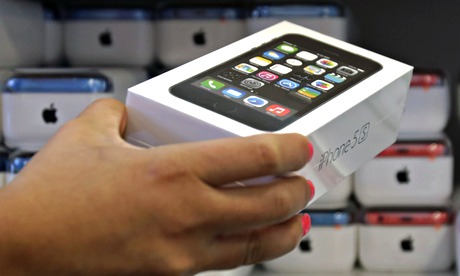
Sales of the iPad have slumped to half their pre-Christmas high, with signs that demand for Apple's tablet computer may be in permanent decline. Despite a forecast-busting $7.7bn (£4.5bn) profit, the computing firm's shares dipped in after-hours trading as sales of its tablet fell to 13.3m from their all-time high of 26m in the quarter to December.
Despite its adoption by thousands of businesses, schools and government agencies, including Australia's Qantas airline, which has 15,000 iPads, and Swedish local government, which has bought 100,000, the 9% year-on-year fall in units sold prompted speculation that Apple has reached "peak iPad".
"If somebody had forecast this two years ago, it would have been seen as a fever dream," said Terro Kuittinen at social media consultancy Magid Associates.
While many phone owners still regard the latest iPhone as a status symbol, it appears tablet buyers are less concerned with replacing their iPad every one or two years.
The slump means Apple is now largely dependent on the iPhone, which sold 35.2m units, up 13% on the same period last year, to fuel growth. Revenues came in at $37.4bn for the June quarter, within the company's guided range, and Apple said revenues would be between $37bn and $40bn in the September quarter.
The company is expected to unveil an iPhone 6 this autumn, with two models with larger screens, and a smartwatch could also arrive in time for Christmas.
"We have an incredible pipeline of new products and services that we can't wait to show you," chief executive Tim Cook said.
Thanks to a distribution deal with China Mobile, which now sells iPhones to its customers, revenues surged 28% in China to nearly $6bn. Performance in America was flat, but Europe grew 6% to $8bn.
Apple's shares yesterday came close to the all-time high of 21 September 2012, the day the iPhone 5 went on sale, but later dipped 0.5% to $94 in after-hours trading.
The shares are up 20% since April, when the company delivered stronger than expected sales, but investors are waiting for the arrival of the watch to decide whether Apple can continue to innovate as successfully as it did under Steve Jobs.
Having reached $705 two years ago (a stock split in June reduced the value of the shares by a factor of seven), making Apple the world's most valuable company, ahead of Exxon, the shares slumped to under $500 as Apple dropped plans to launch a TV and Samsung gained momentum in smartphones.

